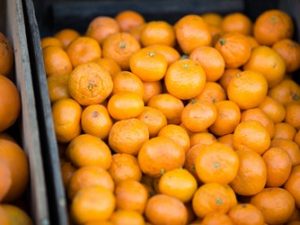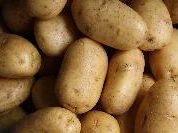Potassium
(K)
You guessed it, good sources are fruits and vegetables.


So, if you’re like most people, when you hear the word potassium, you probably think of banana’s. While banana’s are a good source of potassium, there are a lot of other great sources to keep in mind. Other sources include oranges, cantaloupe, honeydew, apricots, grapefruit, (some dried fruits, such as prunes, raisins, and dates), cooked spinach & broccoli, potatoes, sweet potatoes, mushrooms, peas, cucumbers, milk and yogurt. A medium potato with the skin can provide nearly 30% of your daily value of potassium.
An adult needs 4700mg per day. The typical adult in America doesn’t consume enough potassium. Potassium performs many of the same functions in the body that sodium does. It is critical in maintaining fluid balance, transmitting nerve impulses and contracting muscles. Potassium also influences the excretion of calcium but in the opposite direction that sodium does. When potassium levels are high, calcium excretion declines. Potassium also blunts the effects of a high salt diet and helps keep blood pressure normal.
Hypokalemia (low blood potassium) can be life-threatening. Symptoms include fatigue, weakness, irregular heartbeat and constipation. Too little potassium can raise blood pressure and increase the risk of stroke. People taking diuretics for high blood pressure need to monitor their potassium levels because some of these medications increase the amount of potassium excreted through urine. Those suffering from absorption issues, alcoholics and athletes who exercise heavily need to ensure they’re getting plenty of potassium through their diet.
Getting too much potassium is rare but it can happen in people who have poor kidney function. Healthy kidneys do a great job of filtering out excess potassium. Too much potassium can build up quickly in the blood and can cause irregular heartbeat and even cardiac arrest. Like most vitamins and minerals, it is easy to get the amount your body needs by eating plenty of fresh fruits and vegetables. Potassium supplements should only be taken when prescribed by a doctor.